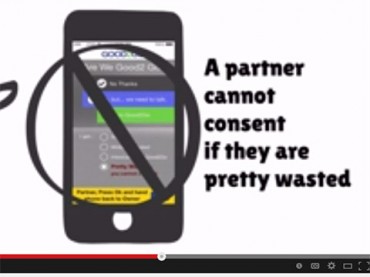
Courtesy of feminist writers, two thoughtful critiques Monday of the notion of “affirmative consent” for sex – just enacted into California law governing colleges – and the new Good2Go sexual-consent app.
Laurie Esseg, a professor of sociology and gender studies at Middlebury College, writes in The Chronicle of Higher Education that “yes means yes” could primarily hurt minorities and the “dispossessed” because the criminal-justice system is already skewed against them:
The “yes means yes” campaign seems shockingly naïve about how law is actually enacted. Increasing the number of sexual acts that are criminal might seem like a good idea if laws were universally imposed, but they are not. Certain populations will be marked as guilty, and that has everything to do with race and class and little to do with justice. …
The law might target only those who have committed sexual assault, but after Trayvon Martin and Michael Brown and the Central Park Five, etc., it is difficult to imagine this happy ending.
There’s also the problem of “consent” interfering with “pleasure”:
In other words, what happens when people get pleasure from not saying yes? Can they consent to nonconsent? A person who wishes to be ravished by her or his lover without any affirmative consent falls into the irrationality that often is sexual desire, an irrationality that has less to do with contract law and more to do with how power can be eroticized.
Writing at Slate, the feminist “XX Factor” columnist Amanda Hess describes the hurdles of using the Good2Go app:
When I tried this process out with a partner, it took us four minutes to navigate through all the screens … I was confused, too: As the instigator, I wasn’t asked to confirm that I wanted to have sex or to state my own intoxication level for my partner’s consideration. …
“Good2Go” is obviously a euphemism for sexual activity, but it’s not clear what that means exactly—is it making out, oral sex, vaginal intercourse, or anal sex, and with protection or not? (I guess you could always pause, grab phones, and start the process over to consent to another specific sexual activity—but at some point, you’d actually have to verbally explain what you’re agreeing to be Good2Go4.)
Hess is actually more worried about the sexual activity log that Good2Go stores (“a dangerous new element”), and which can be released upon legal request, for the sake of rape victims:
That record may help the falsely accused, but it’s unlikely to aid a real victim. Good2Go may remind its users that consent can be revoked at any time, but there are still judges and juries that will take evidence that a person said “yes” to sex at one point, and conclude that they were asking for whatever happened later that night (or the next).
Read the full Chronicle article here and Slate article here.
Like The College Fix on Facebook / Follow us on Twitter
IMAGE: Good2Go screenshot





Please join the conversation about our stories on Facebook, Twitter, Instagram, Reddit, MeWe, Rumble, Gab, Minds and Gettr.